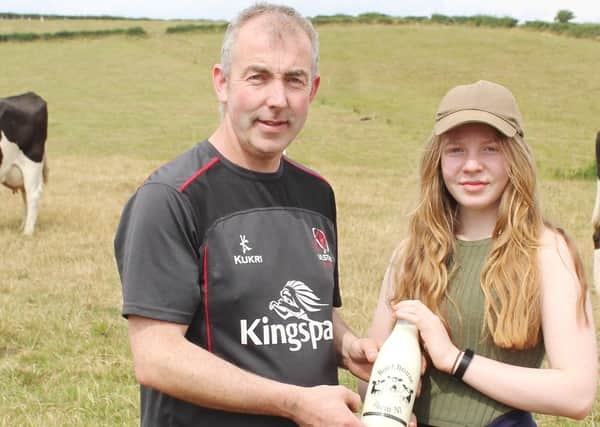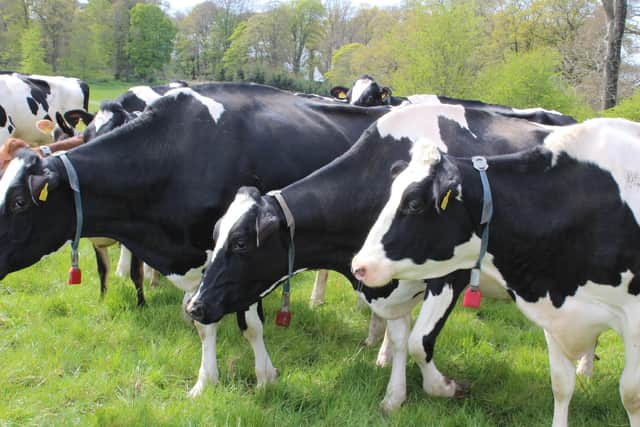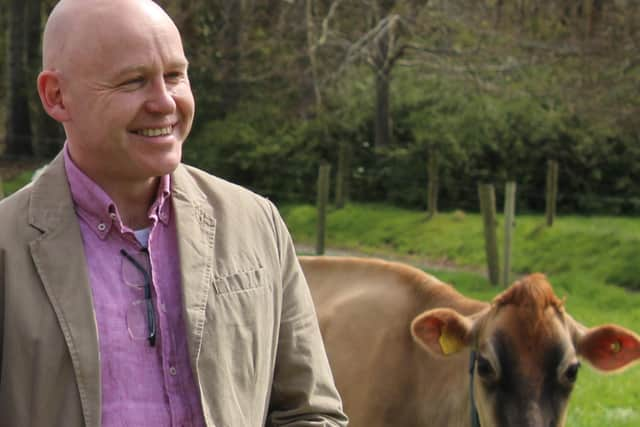Dairy farmers are getting ever closer to the local consumer


t’s a very simple principle: the less reliant that farmers become on commodity sales, the greater the potential to secure a more sustainable return for their produce.
An innovative route to market for an increasing number of local dairy farmers has been that of milk vending.
Advertisement
Advertisement
Rockhouse Farm, located halfway between Saintfield and Crossgar in Co Down, is the latest milk production business in Northern Ireland to go down this road.


Launched at the beginning of May by Brian Hamilton, his wife Susie and family, it really is a case of the new venture going from strength to strength.
Brian explained: “Prior to this we sold all the beef produced by our small herd of suckler cows direct to the public.
“The meat operation, which has a strong grass fed ‘pedigree’, has grown consistently over the past five years with customers coming from as far away as Belfast and Strangford.”
Advertisement
Advertisement
He added: “Our aim has been to take a regenerative approach with regard to the development of the farm as a whole.


“As a consequence, we have reduced the level of fertiliser used within the business and put a clear focus on producing as much beef and milk from grazed grass as possible.”
The development of the milk vending business has required an investment in a pasteuriser plus the required bottle and milk vending machines.
A rigorous health inspection and certification process was also key to getting the venture up and running
Advertisement
Advertisement
Members of the public can source the milk they want in a state-of-the-art building, which has been developed as a cow byre conversion. A car park can be accessed directly from the Saintfield to Crossgar road.
Customers can either bring their own one-litre bottles or source Rockhouse bottles on site at a cost of £2.50. The milk is sold at a price of £1/L.
Brian is already reporting a strong passing trade from customers with the vending operation particularly busy at the weekends.
The Rockhouse herd comprises 40 Friesians cows, with bloodlines going back over many generations.
Advertisement
Advertisement
Brian continued: “We are breeding up the cows to full pedigree status at the present time.
“The herd is exclusively spring calving. So the Friesian is very suited to this form of milk production.
“Over the years we selected specifically for longevity. It is an approach that has paid of with many of the cows now in their sixth lactation and beyond.”
Brian confirmed that selling both home produced milk and beef from the farm complement each other in terms of driving sales.”
Advertisement
Advertisement
He concluded: “It is still very early days, were the milk business is concerned. We are selling full fat milk only from the new vending machine.
“The customer response received up to this point has been very positive indeed.”
So what about the bigger picture, where milk vending is concerned, across the island of Ireland?
According to Kieran Holloway, marketing manager with the Wexford-based vending company Nestry, the growth in milk vending opportunities for Irish dairy farmers reflects the growing consumer interest in sourcing food and drinks that have been produced on their doorsteps.
Advertisement
Advertisement
He points to a growing number of dairy farmers across the island of Ireland, who have submitted licence requests to sell liquid milk from their own premises, adding: “We hope to have our first machine installed on farm over the coming weeks.
“Installing a machine in a local supermarket outlet is another option for farmers wishing to sell direct to the consumer. In this case, official permissions will be required from both the Department of Agriculture and health licensing bodies.”
Holloway confirmed that vending machines, in theory, can offer full fat; semi skimmed and full skim milk, adding: “It all depends on the content of the storage tank behind the machine. But, in reality, farm vending machines will primarily offer pasteurised, full fat milk. This reflects the limited scope on farms to go beyond this offering.”
Driving this trend, according to Holloway, is the growing willingness on the part of consumers to pay a premium price for milk and other food products that they know have been produced in their localities.
Advertisement
Advertisement
“Supporting local farmers is a trend that started to gather momentum across Europe and the UK a number of years ago,” he said.
“Ireland is now playing catch up. Not every Irish consumer will want to pay a premium price for the milk they drink. But enough are willing to demonstrate this level of commitment, in order to make vending a sustainable proposition for a growing number of dairy farmers in this country.”
Significantly, the Nesty representative doesn’t think that the large dairy processors will baulk too much at the prospect of direct farm sales eroding their own well established liquid milk businesses.
Holloway continued: “In the first instance, we are talking of very small volumes of milk per farm, possibly n the region of 200L per day.
Advertisement
Advertisement
“In addition the big dairy co-ops could take the view that milk vending represents an exercise in corporate social responsibility given that it’s their farmer suppliers who are reaching out to local communities across the country in such a proactive manner.”
He concluded:
“Milk vending fully complements the ongoing drive associated with automated sales. The customer coming on to the farm simply interacts with the machine, paying with his or her cash card.
“But it won’t suit every dairy farm. Location is everything. If the business cannot secure a large enough public footfall, then the numbers won’t add up.”
On farm processing of milk is another option. Perhaps the best example of this is Clandeboye Estate, near Bangor in Co Down. In this case, the production of yoghurt has been the route to market for the milk produced by the renowned herd of Jersey and Holstein cows at Clandeboye.
Advertisement
Advertisement
The most recent venture in this regard has been the development of a new premium product – a crunchy and nut-free granola topped Greek style yoghurt that’s available in two outstandingly tasty flavours: Senga Strawberry and Mango.
The new product range was launched as the successful food business, which has won a host of UK Great Taste and other prestigious awards for its outstanding artisan products, is completing a state-of-the-art processing operation on the historic estate.
The new £2 million factory, expected to start production in the next few months, will enable the ambitious company to quadruple production and create 13 new jobs.
The new creamery, which is being developed with support from Invest Northern Ireland, will also be an integral part of the estate’s strategic focus on sustainability and in particular its sophisticated anaerobic digester which uses waste from the farm to power operations including yoghurt production.
Advertisement
Advertisement
This substantial investment by the highly respected enterprise is being undertaken to meet increasing demand for its yoghurts here and in the Irish Republic and also to develop exciting opportunities from approaches it continues to receive from retailers in Britain.
Commenting on the new luxury granola yoghurts, Bryan Boggs, Clandeboye Estate Yoghurt’s general manager, said: “The new granola yoghurt pots have been developed to meet a business opportunity for a premium yoghurt topper that we’ve identified in our on-going market research and regular discussions with Tesco and other supermarkets we supply in Northern Ireland and the Republic of Ireland.
“We currently supply our range of yoghurts to every supermarket chain and the leading symbol groups in Northern Ireland, as well as hundreds of delis and smaller specialist stores. In addition, we create premium yoghurts for Aldi’s premium Specially Selected range in the Republic.
“Tesco was keen on the new product and to be the launch customer. And we are delighted that the new product is now on sale in many of its stores across Northern Ireland from 5 July,” he adds.
Advertisement
Advertisement
The new retail pots have also been influenced by Clandeboye’s longstanding and successful experience in producing luxury granola topped yoghurt snacks for the hospitality sector especially leading café and food-on-the-go chains in Northern Ireland. The Bangor company, furthermore, counts Hastings Hotels Group among its longstanding customers.
The granola yoghurts are set to become a popular and healthy breakfast option in particular to be enjoyed at home, at work or on-the-go.
The yoghurt is produced from fresh milk sourced daily from Clandeboye’s award-winning herd that’s free to graze the rich and clean pastures of the 2,000-acre estate outside Bangor. The historic parkland estate is one of Ireland’s most important and beautiful natural landscapes.
“Everything from grazing to production takes place within the Clandeboye Estate, a complete ‘farm to spoon’ journey,” Bryan continued.
Advertisement
Advertisement
Milk is blended by hand in small batches, resulting in yoghurt that’s creamy and rich in texture and taste but not high in fat.
The new retail granola topped yoghurt range is a further example of the product innovation which has long been at the heart of the quality conscious business that was founded by the late Lady Dufferin, the visionary Marchioness of Dufferin and Ava, in 2007 as a farm diversification project and is now among the most successful of its type in the UK.
The yoghurt enterprise was founded in a desire to add value to the milk from the award-winning herd and use it to create an innovation-led food business that would go some way in sustaining this picturesque estate for the future. Keen on preserving the environment, Lady Dufferin, who died last year, also encouraged the Conservation Volunteers to set up the Northern Ireland base on the estate in 1975.
Clandeboye Estate’s range of Greek style and natural yoghurts were officially launched in 2008 and quickly proved popular with traders and shoppers because of their outstanding flavours and creamy taste.
Advertisement
Advertisement
The new granola topped yoghurts join an extensive range of natural, Greek, strawberry, raspberry, blueberry, toffee caramel and Madagascan vanilla flavours in handy 150g and larger 450g pots. The enterprising local company also has a range of layered Greek yoghurts with senga strawberry,raspberry and white chocolate, mandarin and lime, and mango and nectarine flavours.
The company, furthermore, is a Food NI member and an integral part of the local artisan food community.
It has collaborated with other local ventures over many years, including Morelli’s Ice Cream in Coleraine on a frozen yoghurt, and Irish Black Butter of Portrush in a unique yoghurt flavour.
These are just some examples of the ways in which local dairy farmers are committing to work more closely with consumers.
Advertisement
Advertisement
It’s an approach that will not suit everyone. However, the growth in milk vending and artisan, on-farm dairy business confirms that local consumers want to support, in a very visible and meaningful ways the farmers on their own doorsteps.